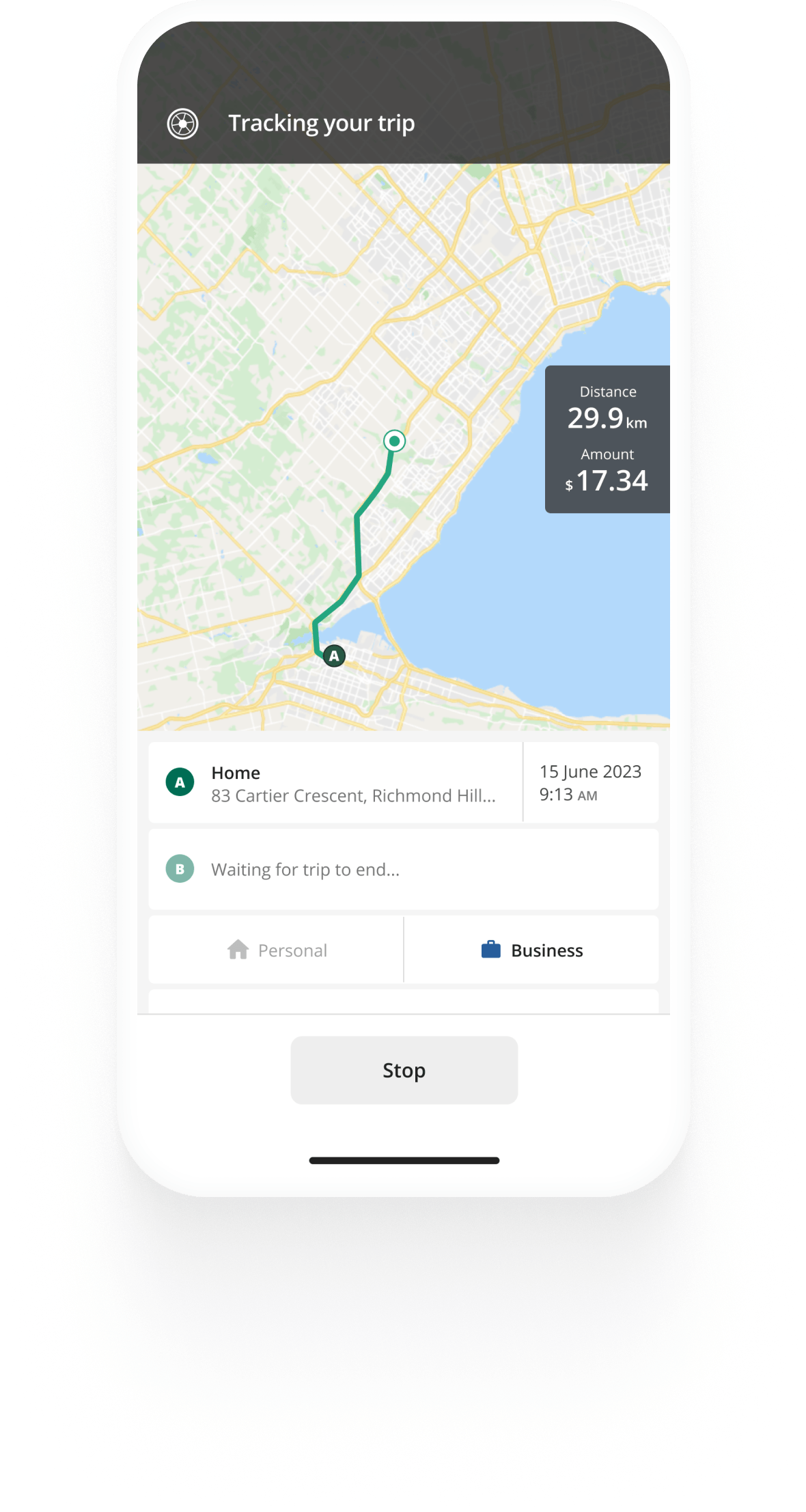Track mileage automatically
Get started
Tax Deductions on Business Use of a Personal Vehicle
If you’re self-employed or an employee who drives a car for business purposes, you may wonder what tax deductions you can claim. Discover which ones you’re eligible for and how to deduct these vehicle expenses when you file your taxes.
Personal use vs. business use of a vehicle
According to the Canada Revenue Agency (CRA), there are two different reasons you would drive a vehicle: personal use and business use.
- Personal use: You’re driving the car for non-employment activities, such as attending personal activities, going on vacations, or travelling between home and a regular place of employment (such as an office, store, or construction site where you regularly report to work).
- Business use: You’re driving the car to perform employment duties, such as transporting goods, attending a conference or business meeting, visiting a client, or visiting other work locations that’s not your regular workplace.


Track business driving with ease
Trusted by millions of drivers
Automate your logbook Automate your logbook

Automatic mileage tracking and CRA-compliant reporting.
Get started for free Get started for freeTax implications for using your car for business
You may be eligible for certain tax deductions if you drive your vehicle for work-related activities. Exactly what you can claim depends on your employment situation.
Employees
All employees:
- Can claim expenses related to driving their vehicle for business purposes.
- Cannot claim expenses related to personal use.
- Cannot claim any vehicle expenses if your employer reimburses you.
- If you receive a flat-rate allowance from your employer, it’s a taxable benefit.
- Have a log that keeps track of all the kilometres you drove and the kilometres you drove for work purposes.
- If you have more than one car that you use to earn income, you’ll need to calculate the expenses for each of them individually.
Salaried employees:
You can claim motor vehicle expenses if you meet all of the requirements:
- You’re required to work at locations other than your regular workplace.
- You pay for car expenses that aren’t reimbursed, as stated in your contract.
- You receive a regular paycheque based on your salary.
- You did not receive a non-taxable (reasonable per-kilometre rate) allowance.
- You have a record of the Form T2200, Declaration of Conditions of Employment filled out by your employer.
Commission employees:
- You can claim vehicle expenses if you meet all of the conditions:
- You work at locations other than your regular workplace.
- In your contract, you have to pay out-of-pocket for car expenses that aren’t reimbursed.
- You have a commission-based job, which is based on your sales or contracts signed.
- You did not receive a non-taxable allowance, such as a reasonable-kilometre rate.
- You have a record of Form T2200, Declaration of Conditions of Employment filled out by your employer.
How to deduct vehicle expenses on your tax return
Step 1: On Form T777, Statement of Employment Expenses, you’ll need to add your vehicle expenses in the section “Line 3 - Calculation of Allowable Motor Vehicle Expenses.”
You’ll be required to enter the following information:
- Year, make and model of your car
- Formula: kilometres driven to earn income ÷ total kilometres driven = % you can claim
Then, you’ll enter your vehicle expenses:
- Fuel
- Maintenance and repairs
- Insurance
- License and registration
- Capital cost allowance
- Interest expense
- Leasing costs
- Other expenses
You’ll calculate the total and multiply it by the percentage you can claim.
If you have any rebates or reimbursements, you’ll need to deduct these from your expenses to determine the total amount of vehicle expenses (line 32).
Step 2: Take the amount from the total expenses (line 32) on Form T777 and enter it on line 22900 of your tax return.
Self-employed
If you use your vehicle for business and personal use, you can claim the portion of vehicle expenses related to business use. The exception to this rule is that you can claim the full amount of parking fees and business insurance.
How to deduct vehicle expenses on your tax return
Sole-proprietors: On Form T2125, Statement of Business or Professional Activities, you can calculate the total vehicle expenses in “Chart A – Motor vehicle expenses.”
You’ll need to record the kilometres you drove for business purposes and the total number of kilometres you drove the car. This will determine the percentage of vehicle expenses you can claim. Fuel, insurance, maintenance and repairs are expenses you can deduct.
Partnerships: You can claim vehicle expenses through the business use of your personal vehicle on Form T2125 in Part 6 “Other amounts deductible from your share of net partnership income (loss).” Ensure you’re only claiming expenses that aren’t reimbursed by the partnership.
Records you need to keep
Regardless of your employment situation, you must keep a detailed mileage log when driving your car. This way, if the CRA asks you for this information, you can provide it to them. Keep the receipts of any vehicle expenses so you can claim them on your tax return.
FAQ

Tired of logging mileage by hand?
Effortless. CRA-compliant. Liberating.
Latest posts
- Taxable Employee Benefits in Canada
- FAQ About The CRA Automobile Allowance
- Free CRA Mileage Log Template
Related posts
CRA Mileage Rate 2024
January 2, 2024 - 2 min read
The CRA announces 2024 rates for vehicle allowance: From January 1st, 2024, per kilometre rates will increase 2 cents over 2023.
Taxable Employee Benefits in Canada
April 7, 2025 - 10 min read
Which benefits do you offer your employees? A full list of the taxable employee benefits in Canada, and how you calculate their value.
FAQ About The CRA Automobile Allowance
April 7, 2025 - 5 min read
FAQ: What you want to know about automobile allowances and reimbursements as per CRA guidelines for businesses and employees.


